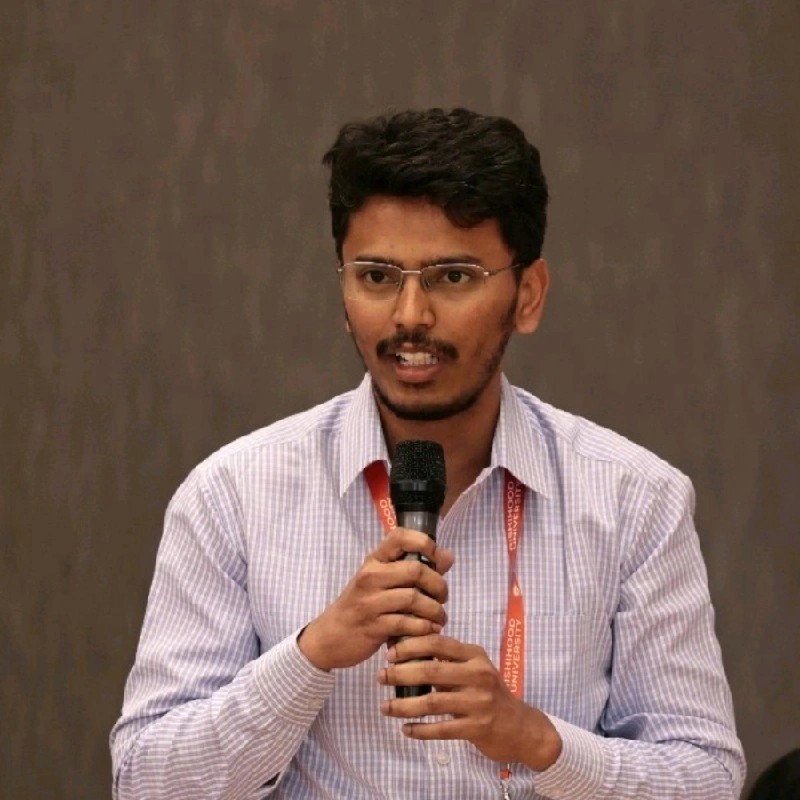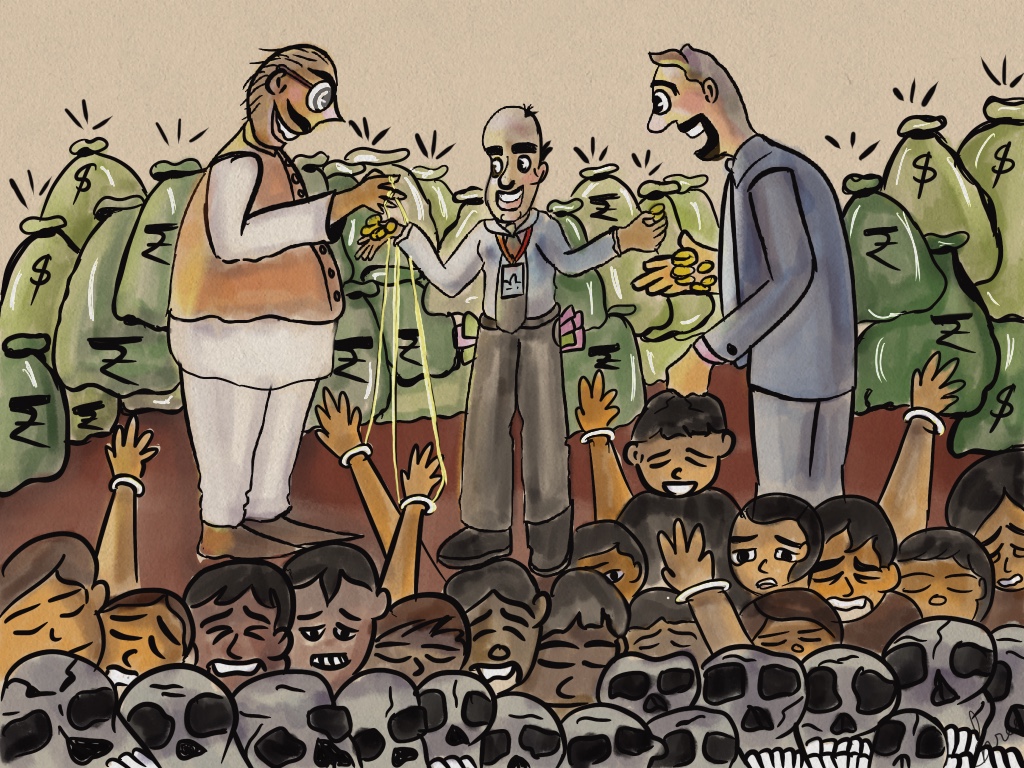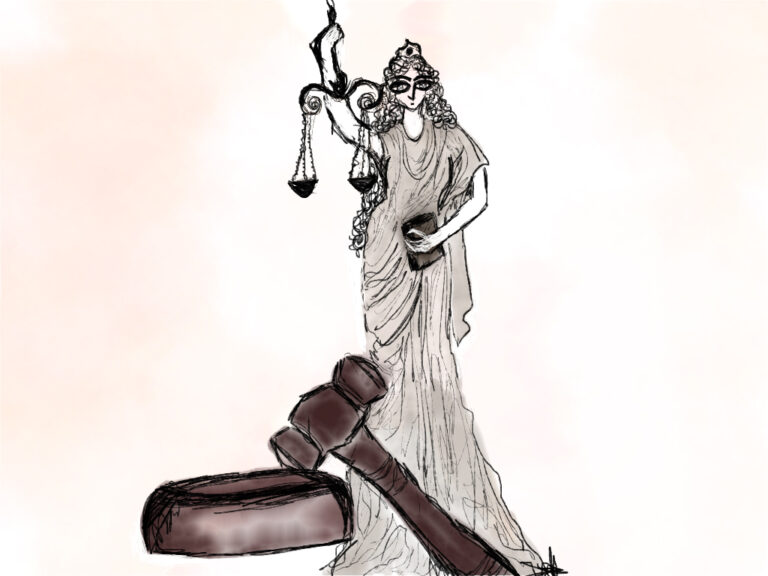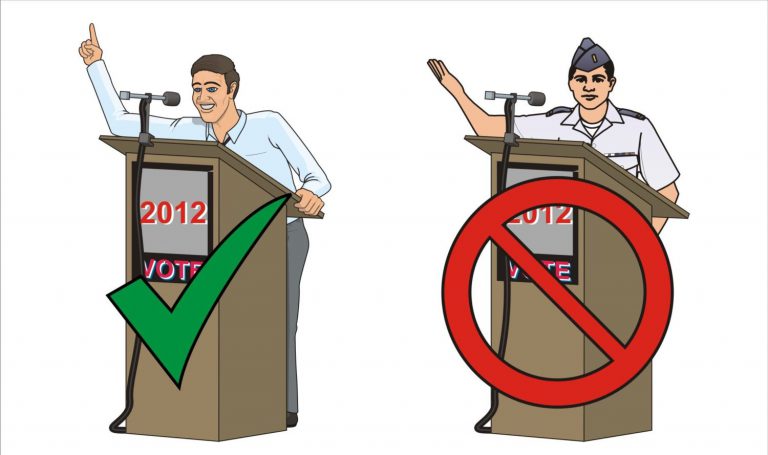In today’s India, making of the business that is called politics

Srinath is the Founding Editor of The ArmChair Journal. Currently at the University of Chicago, he is also an alumnus of IIT Madras, Ashoka University, Rishihood University and Purdue University.
A habit that I rejoice in is having coffee at work. That gives me time to stay with some naturally occurring thoughts – the space that’s needed to make sense of things. During one such coffee breaks at a roadside tea stall in the busy commercial city of Mumbai, I saw a blue police vehicle stop. While the engine was still on, a policeman put his hand out of a window. The street vendor selling cigarettes beside me came to the stall where I was standing. The tea seller gave him a hundred rupee note. He collected the hundred rupees notes from a couple of other street vendors, went back to his stall to take a cigarette packet, and put them all in the hand hanging from the window. The vehicle moved on casually. As I looked surprised, the tea seller said, “Kya kar sakthe hain.” As I walked back, I wondered if I was in the India of the 90’s. Does money get you power? Or, does power get you money?
India’s most prominent businessman has been in the news for longer than expected. The rise of Adani has generally been attributed to the politics-business nexus, popularly captured as ‘Modani’. The consecutive Hindenberg reports during parliament sessions and the allegations under FCRA by US-SEC have kept Adani in the limelight. It is not a normal business issue as allegations are related to Adani’s close links to the ruling state/central governments in India. These could be true, or false – the law and the institutions will decide. However, a common Indian citizen is more or less indifferent and probably unconcerned about any nexus with politicians Adani has though it has been a repeated theme in public discourse.
This article is not about the links of any particular businessman like Adani with politicians however big or small, but about the vulnerability of politics – about how practical politics can succumb and be erased by commercial interests. Most of this article is a coherent documentation of open secrets.
The goal of practical politics in simple terms is to shape public policy for social good or to improve the lives of people in general. There can be many interpretations based on the choice of words, as the concept is abstract. Several such notions in political science literature broadly come under theories on politics.
While there may be many ways of doing good through politics, an enthusiastic realist would suggest that politics is all about power. But what is it about power, that is so attractive? Is power aimed to serve an individual’s desire for superiority and domination over others? Or, is it just about being perceived as the victor? You can decide many things at the stroke of a pen. However, in a society where everything is commercialized, is there anything more than money that is valuable and powerful? Can power overcome money too? Is power superior to money? Does power really provide the opportunity to do what one wills?
There isn’t much dispute when someone says power is the most significant idea that captures politics. But probably, it is not power – the commercialization of the world around us in every form means that even power is also commercialized. Commercialization of power means that power becomes subservient to commercial interests and power as such is meaningless without realizing its worth through commercialization. The dominance of commercial interests means commerce can determine who should be in power. This could also mean in return that power itself is another means towards becoming more commercial – thereby making power an instrument and an investment to do business and nothing more. A politician needs a competent businessman to realize what his power is worth.
All political activities done to gain democratic legitimacy, are to serve this end of earning power to invest in businesses. While economics generally considers land, labor, and capital as the factors of production for commercial activity, power is another factor of production at higher levels that determines who is finally successful in the game of business among business leaders. Like a politician needs a competent businessman, a businessman with a politician in his pocket is always more successful. With power as an investment, there is no looking back for any business.
Triumvirate: Systemic corruption
There are three vital stakeholders in India’s policy landscape: The political parties, the bureaucrats, and the businessmen. All three of them have their own unique characteristics and can exist independently of each other. However, when they interact with each other, they create magic – the extra ‘2ab’ when (a+b) multiplies with another (a+b) – as the Indian prime minister noted while discussing India – Canada relations. The magic that is created should be called Governance in some sense. However, the magic can also take many other forms as there is no power above it: Systemic Corruption, Crony Capitalism, Oligarchy, Policy manipulation, etc.

Systemic corruption means that the system has ways of circulating illicit money even when individuals don’t show any particular interest. Your office is held sacrosanct that irrespective of the person who holds them, a certain amount is paid as per standards and tradition. While there may be officers and politicians who actively deny such illicit money, the system benefits you even if you are silent (unless you reject it explicitly). Generally, all the stakeholders sink together and so, keep each other’s backs as a silent understanding. Officers might change, but the sum normally reaches the new officer without any hassles. The system develops a logic based on practices established over time.
Similar to the ‘2ab’, an interaction between these 3 stakeholders can lead to situations where there are no limits to magic. The magic that can be created is only as much as how much one understands the other well enough and brings the stakeholders together. The following tables give a sense of how the stakeholders are aligned.
| S.No | Component | Politician | Businessman | Bureaucrat |
|---|---|---|---|---|
| 1 | Investment | Power | Money | Power |
| 2 | Role | Shareholder | Book Keeper | Sleeping Partner |
| 3 | Responsibility | Opportunity provider | Running the business | Gatekeeper |
| 4 | Profit Sharing | Based on discussions and state standards | All that is left | Based on state standards |
| 5 | Risks | Exposure by future governments or rare whistleblowers | Probably lesser risk compared to politicians, as the money can woo all governments | The scapegoat in case of exposure by future governments or rare whistleblowers |
| 6 | Strength | Power to decide/tweak policies and allocate contracts | Ability to sell products | Permanent player, can exercise power at discretion, like keeping approvals on hold |
| 7 | Weakness | Desperation about the temporary nature of power | Temptation is to expand business to earn more once their business model is working | A perennial state of being passive – as a bureaucrat can’t dictate things much |
| 8 | Interdependence | Needs a successful business with assured markets to be a partner | Needs policies that suit the business plans | Who says No to easy money? |
| 9 | General public perception | Lack of character, ruthless, sometimes criminals/rowdies | Greedy with no other intention | Mute observers with good image. |
| Examples | ||||
| 10 | Example 1:Airport construction | A politician plans a new airport and includes space for a luxury hotel within the premises with a particular hotel chain in mind | The hotel chain gets someone to invest in a politician’s company as a quid pro quo | Ensures that all paperwork is consistent with required norms and due processes followed |
| 11 | Example 2:A dam project | A politician plans a huge dam and allocates funds in the budget with a specific contractor in mind | Sends money to the political party through electoral bonds | Ensures that all paperwork is consistent with required norms and due processes followed |
| 12 | Example 3:A sand mining project | A politician ensures that a new policy regarding sand mining is being forged with the whole resource in the state to be managed by a particular contractor | Ensures that the mining premises are excavated in more than the licensed amounts and loots the natural resources | Ensures that all paperwork is consistent with required norms and due processes followed |
| 13 | Example 4:A deal related to the construction of a metro station | Politician ensures that metro line passes through a particular region so that local businesses are devastated | Establishes purchase of land beforehand to construct new shopping malls in the affected areas | Ensures that the project is executed as planned and all paperwork is consistent with required norms and due processes followed |
| 14 | Example 5: Information on new policies | Politician purchases stocks of a company with future policy in mind, like a policy on cryptocurrencies | The businessman knows the policy beforehand and hoards cryptocurrencies or plans accordingly | Ensures that all paperwork is consistent with required norms and due processes followed |
Power and its market size
A political party is an organization that is aimed at capturing power. Parties have well-organized to loose internal structures based on their history, origins, leadership style, etc. Politicians fight tooth and nail at the time of elections. Some states even see violence. They do all it takes to get the winning party tickets, indulge in vote buying through illicit means like money and liquor, try methods like fake voting, etc., to win by all means. Out of desperation, there is also violence sometimes at many booths. These are all open secrets, but why do they do that? There are two ways of using power as an investment.
First, whenever a political party forms the government after the elections, the party comes in control of the budget spending every year. It must be remembered that the hierarchy of power affects the market size of an individual. Varying from a chief minister to a cabinet minister to many appointed positions to the local legislative members to local influencers, the money is distributed across the whole chain of relevant stakeholders in proportion to the power, position, and influence they have.
| S.No | Item | Details |
|---|---|---|
| 1 | Total budget of central government yearly | 45 lakh crores |
| 2 | Total budget of all 30 states combined (excl grants from center to avoid double counting) | 55 lakh crores |
| 3 | Total budget of state and central governments combined yearly | 100 lakh crores |
| 4 | Assumed discretionary spending per year (Excl committed expenditure like salaries, pensions, interest payments, etc) | 45% of total implies 45 lakh crores |
| 5 | Assumed leakage per year | 5% of discretionary spending implies 2.25 lakh crores |
| 6 | Total population | 135 crores |
| 7 | Leakage per crore population | 1500 crores |
| 8 | No. of assembly constituencies per crore population | ~35 |
| 9 | Leakage per assembly constituency | 40 crores per year |
| 10 | Leakage per assembly constituency in 5 years | 200 crores |
| 11 | Investment per assembly constituency per election | 25 crores |
| 12 | Return on Investment | 700% |
Second, politicians also have control over policy aspects outside of budget spending. In some cases, depending on where you are and the economy of that region, there are additional markets. For example, if you are in an area where rivers flow, you would have sand to mine and sell illegally. If there is a forest region, there might be other resources to tap into. If there is a port in your constituency, there might be some other opportunities related to illicit trade. As long as you command influence in the region, all revenue is yours. The size of this could be as high as the first option. However, let’s not consider this quantum for the sake of a conservative estimate and to avoid unfair analysis.
A political party’s business model
Every business has a business model with a product to be sold, target customers, and how the profits are made. The product of political parties is essentially psychological and intangible like the entertainment industry. In popular terms, the product offered by political parties is being referred to as the political narrative these days. Concepts like propaganda and ideology are also similar to political narratives. The way a political party manages the finances is very similar to how producers manage finances in movie making.
The supply chain of movie making involves a producer who finances the project to make the movie with a strong technical team made of a movie director, scriptwriters, music directors, production managers, etc. After the movie is made, distributors purchase it from the producers and exhibit it in theaters taken on rent/lease in their constituencies. Similarly, a political party also has a central office that is responsible for its core narrative. This core narrative is built over a period of 3-4 years ahead of the elections. Weaved around the party’s core ideology, the competitor environment, and the prevailing public sentiments and issues, the narrative supported by competent individuals and teams would involve the message propagated through twists, betrayals, character building/assassination, emotion, wit, abuse, satire, track record, manifesto, etc., displayed through many stages and formats like field campaigns, public speeches, rallies, press conferences, pamphlets, debates, interviews, social media, etc.
For an established political party, the cost of running a party is the cost of implementing the narrative, in terms of its creation and distribution. This process could take up to 2-3 years before elections and could cost a few hundred crores – which is funded together by the party’s central leadership and the local politicians. Sometimes, there could be partners like media channels who could help reduce the cost of production and dissemination of narratives as they hope to reap benefits if the party comes to power. Hence, if you own a media channel, you can help a political party in its narratives and be a partner in the future business that can be collectively established. That’s why we see many media channels owned by big businessmen to build closer strategic ties with politicians. This is also the reason for eliminating the media channels that are not your partners.
Once the product is ready closer to a few months before elections by the time the Election Commission announces the election schedule, a good amount of this production cost is recovered by the central party leadership by selling party tickets to candidates who want to contest elections. The candidates in their constituencies are like distributors who purchase the movie rights for their region and also further invest in taking the movie closer to people in expectation of winning positions. The cost of these party tickets would be higher if the party’s narrative appears to be winning in the elections, or if there are many sources of revenue in the constituency that can be tapped through political positions.
The culmination of all of these activities by political parties is on polling day when voters make their choices to decide whether the movie is a hit or a flop. If it is a hit, you can wield your power as an investment to earn money through the methods discussed above. An RoI of 700% definitely sounds exciting.
But what happens if you lose? You would be hounded. All methods will be deployed to cripple your capability to run the party further. Your financial sources will be targeted, and your ability to reach the public will be targeted. All means will be employed to eliminate you as a competitor.
What is at a loss?
When socio-political issues become an investment opportunity, the actual space of politics as a means to change lives of people is undermined. Any definition concerning politics whether it is to do good, or to capture power is undermined. The amount of corruption that can happen in the public administration is directly proportional to the motives of politicians entering into vital positions. If commercialization is unchecked with a repeated emphasis to normative values of public life, politics becomes empty of any particular meaning other than commercial interests. This erasure of politics from the public life of citizens is also the addition of politics to the investment portfolio of business big shots.
Democracy is primarily about the opportunity that people have to steer society in the direction they want to. The opportunity can be seized, or people’s choices can be manipulated through mass media production and control. The first is easier to spot as the autocratic mode is traceable and the choices that people make appear to be directly taken away. The second case is intangible and is about appearances. Laws will be made in the name of people and society will be ruled in the name of people – but just that. That will be far from the democracy that we assumed we had.
Politics is a place where the business has to be about changing people’s lives. In the midst of all the push from established social logic and structures that propel society in a particular direction, we need to preserve a space to correct any course of action that we see as unfair. The loss of such a space is the loss of the opportunity to be political, one of the natural states of being human. If the business of politics shifts to just being commercial, it is as good as we are electing investors instead of politicians.
In such a scenario, politicians become social parasites, instead of solving social problems.








Thank you for your comments, Dr Jyoti Raina, Dr. Jayan Philip and Shree.
I have been reading your writings since several years. I have admired your argumentative analysis, directness of language and objectivity of stances take. This piece is among your best where you cogently and with details argue how politics, business and bureaucracy align to perpetuate a status quo in economic, social and political life. Fortunately or unfortunately this is a kind of arrangement that is receiving popular support from the citizenry. The ruling establishment irrespective of political party has remained indifferent to structural social transformation. This is true of societies world over.
The article is well-written, and with the examples shown, they’re easy to understand. It is transparent how corruption is alive and evolving through generations in India.
It is well articulated and precise in its judgement of today’s political developments and governance. According to me and the author, the Indian politician is well-versed in business and has become a power centre of unaccounted money.